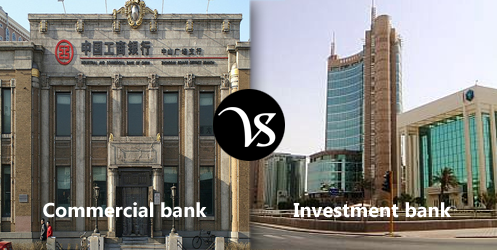 Commercial bank:
Commercial bank:
A commercial bank is a type of bank that provides services such as accepting deposits, providing business loans, and offering basic investment products. Commercial bank can also refer to a bank that mostly deals with deposits and loans from large businesses. Commercial banks plays a vital role in providing short term and medium term financial requirements.
Investment bank:
An investment bank is a financial institution that assists individuals, corporations and governments to raise financial capital by underwriting or acting as the client’s agent in the issuance of securities (or both). An investment bank may also assist companies involved in mergers and acquisitions (M&A) and provide ancillary services such as marketing, trading of derivatives and equity securities, and FICC devices (fixed income instruments, currencies and commodities).
Differences:
| Basis |
Commercial bank |
Investment bank |
Definition
(www.oxforddictionaries.com) |
A bank that offers services to the general public and to companies. |
A bank that purchases large holdings of newly issued shares and resells them to investors. |
| Objectives/Purpose |
Its objectives are:
- two-fold
- offer a robust suite of services
- maximize revenue
|
Its objectives are:
- to provide services to private and public companies
- raising capital
- acts as a broker
|
| Role |
The main role of commercial banks are:
- Mobilising saving for capital formation
- Financing industry
- Financing trade
- Financing agriculture
- Financing consumer activities
- Financing employment generating activities
- Help in monetary policy
|
The main role of Investment banks are:
- Role as an advisor
- Underwriting stocks and bonds
- Financial advisory roles
- Mergers and acquisitions
|
| Types |
Its types are:
- Consumer or retail banking
- Business or corporate banking
- Securities and investments
- Nontraditional options
|
|
| Pronunciation |
- Eng (UK): /kəˈməːʃ(ə)l / /baŋk/
- Eng (US): / kəˈmərSHəl/
|
- Eng (UK): /ɪnˈvɛs(t)m(ə)nt / /baŋk/
- Eng (US): /inˈves(t)mənt / /baNGk/
|
| Main function |
Its functions are:
- Commercial banks collect capital from the general public in terms of the deposits and mobilize to the productive fields to activate the entire economic sector.
- Commercial banks issue various credit instruments like cheque, bank draft, travelers cheque, credit cards, letter of credit etc. That assure fast and safe remittance of money.
- Accepting deposits
- Current a/c
- Saving bank a/c
- Fixed deposit a/c
- Providing loan
- Serving with agency function
- Exchanging foreign currency
- Transfer of money
- Providing guarantee on the behalf of the client
- Issuing capital
|
Its functions are:
- Corporate finance
- Equity research
- Assets management
- Investment management
- Boutiques
- Mergers and acquisitions
- Structuring of derivatives
- Merchant banking
- Risk management
|
| Customers |
It may have millions of customers. |
It has a few hundred core customers or less. |
| Loans |
It provides a lending service to their customers. |
It doesn’t provide loans. |
| Service |
It provides a very standardized service. |
It provides a much bespoke service. |
| Advantages/Benefits |
Its advantages are:
- More locations
- Discounts
- More product offerings
- Invoicing services
|
Its advantages are:
- Assured returns
- Capital protection
- Tax advantage
- No downside risk
|
| Disadvantages |
Its disadvantages are:
- less customer oriented
- loan approvals
- rigid standards
- security
- credit tough to find
|
Its disadvantages are:
- Low return compared to stock market
- Inflation is high, returns may be negative
- Lock in period leads to a lack of liquidity
|
| Example in Sentence |
- Commercial bank takes deposits.
- Commercial bank provides strategic advice to the companies.
|
- Investment bank does not provide the transactional day to day services.
- Investment bank provides the strategic advice to the companies.
|
 Commercial bank:
Commercial bank:




